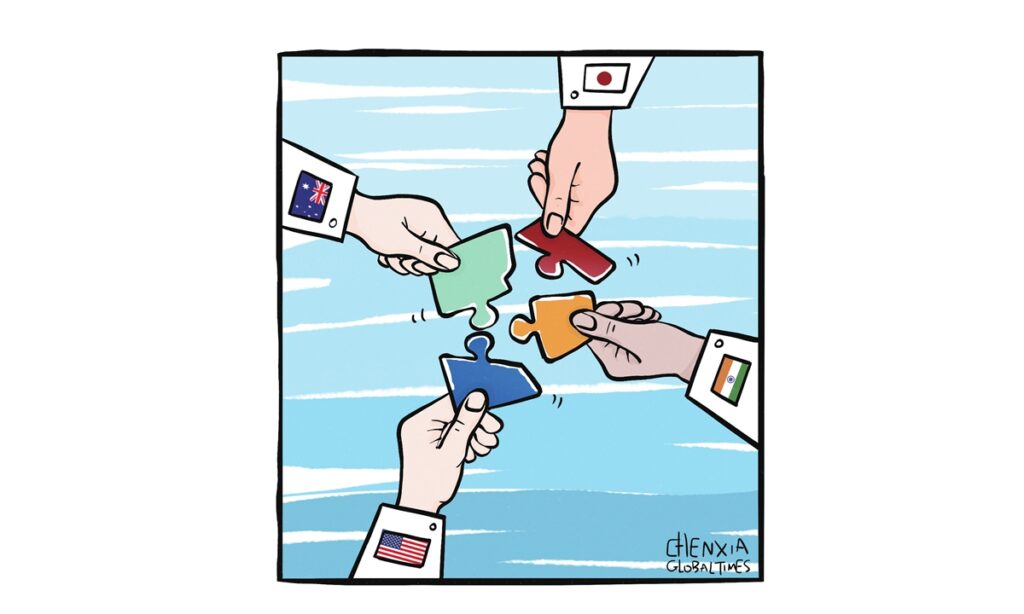The annual Malabar naval exercise, participated by the navies of the Quad countries – US, Australia, India, and Japan – will be held on Friday, marking the first time the exercise is hosted by Australia. Discussions about deepening military cooperation among the Quad member – which could lead to Quad collective maritime defense, have been emerging.
A report issued in June by United States Studies Centre at the University of Sydney, entitled, “Bolstering the Quad: the case for a collective approach to maritime security,” suggests that the Quad should use this diplomatic opportunity and geostrategic imperative to implement a collective maritime security strategy in five high-priority areas, including anti-submarine warfare and maritime domain awareness. On Tuesday, Nikkei Asia published an opinion article “The Quad is edging closer to collective maritime defense,” stressing that Australia’s hosting of Exercise Malabar provides opening for deeper cooperation.
The Malabar exercise can be viewed as preparing to help the Quad build operational capability. From initially being a consultative partnership to now focusing on enhancing its operational capability through military exercises, the Quad mechanism has shown significant change in its development. In fact, the US is creating an alliance-style defense structure based on a non-military alliance collaboration by strengthening various modes of military cooperation. The emphasis on geopolitical and international changes in the report clearly reflects the US intention to make Quad better serve the US in global geopolitical competition and strengthen its advantage.
Although the Quad is developed under the name creating a “free and open” Indo-Pacific region, the countries have different focuses on their key interests. Yang Xiyu, a senior research fellow at the China Institute of International Studies, told the Global Times that in the context of the multipolar trend in the 21st century, when it comes to military alliance based on collective security core clauses, the more participating countries there are, the less consensus they would reach. Therefore, in the 21st century, it is impossible to implement such military cooperation filled with Cold War thinking.
Whether or not the Quad forms a collective maritime defense mechanism, it is only a paper tiger strategically. Quad members may make a lot of noise during peacetime. However, when specific conflicts arise, the effectiveness of this so-called non-treaty-constrained maritime defense is highly questionable. Li Haidong, a professor at the China Foreign Affairs University, told the Global Times that the US’ establishment of the Quad mechanism is not a mechanism for fostering cooperation, consolidating mutual trust or strengthening cooperation in the Indo-Pacific region. It is a mechanism for creating confrontation, division and even conflicts. The military cooperation of the Quad, such as the Malabar exercise, is just a joint effort of the four countries to serve US hegemonic interests. Whether other countries are willing to be bound together by the US when the US exercises hegemony to the utmost, is another matter.
The Malabar exercise is a show of military muscle, intentionally targeting China and hyping up so-called China threat theory, based on the logic of the beaten track – big powers must be seeking hegemony, despite the fact China’s words and deeds which prove that China has never thought of or opted for pursuing hegemony when growing stronger.
Regardless of how the US plays the Cold War card or the hegemony card and how it encircles China militarily, China will continue to promote cooperative development. With the passage of time, the so-called China threat theory will collapse on its own. Yang Xiyu said that the US’ attempt to contain and suppress China through the Indo-Pacific Strategy is like trying to catch the moon in the water. No matter how much effort is made, it will ultimately be in vain.
Whether it is the Malabar exercise or the Quad itself, their purpose is to create and sow disputes and turmoil in the Asia-Pacific region. Li Haidong believes that the further deepening of the Quad mechanism should alert countries in the Asia-Pacific region because it not only threatens China’s security but also, and more importantly, the overall security of the region.
(Global Times)




